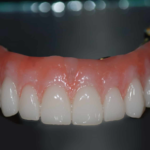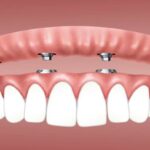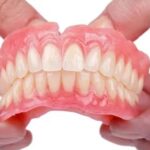A Temporary Dental Crown is a cap used to cover a damaged or decayed tooth until a permanent crown is ready. Temporary Dental Crowns are commonly used as a protective measure for fillings, root canals, and dental implants.
They are designed to be a temporary solution, lasting usually two to three weeks until the final crown is cemented in place. Temporary crowns are made of acrylic or composite resin and are usually created in the dentist’s office during the same visit.
They are then cemented with temporary adhesive. Eating hard or sticky foods should be avoided to prevent the temporary crown from falling out or breaking. Additionally, proper care must be taken to maintain the temporary crown, including regular brushing and flossing. In case of any discomfort, it is best to contact a dentist for further evaluation.
Introduction To Temporary Dental Crowns
Temporary dental crowns are used to protect damaged teeth before a permanent crown is fixed. They are not meant to be long-term solutions and may fall off easily, so it is best to avoid hard, sticky, or tough foods. It is important to take care of temporary crowns to prevent pain and ensure their functionality.
Temporary dental crowns are used to protect a tooth that has undergone a dental procedure and needs time to heal before a permanent solution is put in place. These crowns are placed using temporary cement and are not meant to be a permanent solution. They can protect the tooth and allow the patient to have normal bite functionality while waiting for a permanent crown. It is important to take care of temporary crowns and avoid hard and sticky foods to prevent them from falling out. The cost of these crowns varies, and it is essential to consult a dental professional for proper guidance. In cases where temporary crowns fall out, it is best to contact a dentist immediately to avoid any further damage. Pain after a temporary crown is possible, but it should not be severe. It is crucial to follow oral hygiene practices and take care of the temporary crown until it is replaced with a permanent solution.

Credit: www.brooklynheightsdental.com
Types Of Temporary Dental Crowns
There are different types of temporary dental crowns available, such as stainless steel, acrylic, and composite resin crowns that can be used to protect a damaged tooth or cover a dental implant. Each type has its own advantages and disadvantages, and your dentist can help you choose the best temporary crown for your needs.
| Type of Temporary Dental Crowns |
|---|
| Stainless Steel Crowns |
| Acrylic Crowns |
| Composite Crowns |
Temporary dental crowns are a common solution for protecting your tooth after a procedure such as a root canal or dental implant. Stainless steel crowns are often used for children, as they are durable and cost-effective. Acrylic crowns are also a popular choice, as they can be customized to match the color of your natural teeth. Composite crowns are made of a plastic material mixed with glass or ceramic particles, making them more natural-looking than stainless steel or acrylic crowns. It is important to follow your dentist’s instructions for care and maintenance of your temporary crown, as they are not meant to be a permanent solution. It is also common for temporary crowns to fall out, but your dentist can easily replace it for you.
:max_bytes(150000):strip_icc()/numbing-the-tooth-in-a-dental-crown-procedure-1059036_final-788dfa05acf24255aa0d406f45df1b31.png)
Credit: www.verywellhealth.com
Caring For Temporary Dental Crowns
Taking care of a temporary dental crown is essential to avoid any damage or dislodgement. It is recommended to avoid sticky or hard foods, brush gently twice a day and floss carefully. In case of crown displacement or feeling pain, it’s advisable to contact the dentist immediately.
| How long do temporary dental crowns last? | A temporary dental crown can last for up to a month or more, depending on the individual’s oral hygiene practices and the condition of the underlying tooth. |
| What to do if your temporary dental crown falls off? | If your temporary dental crown falls off, it is important to contact your dentist immediately. Avoid chewing on that side of your mouth and keep the crown in a safe place until your appointment. |
Caring for Temporary Dental Crowns Temporary dental crowns serve as a placeholder for the permanent crown and help the underlying tooth to stay protected. Here are some do’s and don’ts to keep in mind while caring for your temporary dental crown:
- Do: Brush your teeth gently twice a day with a soft-bristled toothbrush.
- Do: Use dental floss gently to clean the area around the temporary crown.
- Do: Avoid eating hard, sticky, or chewy foods on the side where the temporary crown is placed.
- Do: Contact your dentist immediately if the temporary crown falls off or if you experience any pain or discomfort.
- Don’t: Bite your nails or chew on pens, as this can damage the temporary crown.
- Don’t: Use toothpaste that contains baking soda, as it can cause irritation to the gum tissues.
- Don’t: Try to fix the temporary crown yourself with glue or adhesive, as this can lead to further damage.
Remember to follow these tips to maintain your temporary dental crown until you receive your permanent crown.
Benefits And Risks Of Temporary Dental Crowns
Temporary dental crowns are used to cover a damaged tooth until a permanent crown can be made. It is important to weigh the advantages and risks before considering a temporary crown. Some of the benefits of temporary dental crowns include:
- Provide protection to damaged teeth until permanent crowns are ready to be placed
- Helps prevent further damage or decay of the tooth
- Can be used to test the fit and feel of a permanent crown before placement
There are also possible risks and side effects to consider when getting a temporary dental crown, including:
- Possible sensitivity or discomfort around the tooth
- Temporary crowns are not made to last long and may wear down or break off over time
- The temporary crown may not fit well, causing pain or discomfort
It is important to discuss the risks and benefits with your dentist before getting a temporary dental crown to determine if it is the right option for you.
When To Replace Temporary Crowns With Permanent Ones?
Temporary dental crowns are an essential part of the process of fitting permanent ones. Generally, temporary crowns should be replaced with permanent ones within two to three weeks to prevent potential damage to the adjacent teeth and avoid any discomfort or pain.
A temporary dental crown is an affordable and effective solution for people waiting for their permanent dental crown procedure. As the name suggests, temporary crowns are made to last for only a short amount of time, typically 2 to 3 weeks. It is crucial to replace the temporary crown with a permanent one as soon as possible to avoid complications. The temporary crowns are designed to provide only limited coverage, which can cause sensitivity or pain if worn for an extended period. Additionally, temporary crowns are susceptible to damage due to chewing hard or sticky foods. Therefore, it is advised to avoid hard or chewy foods while wearing temporary crowns. Careful maintenance and good oral hygiene can help extend the life of temporary crowns. Remember, temporary crowns are only a temporary solution; it is essential to consult with your dentist to schedule a permanent crown procedure.

Credit: en.wikipedia.org
Alternative To Temporary Dental Crowns
| What Are Temporary Dental Crowns? |
| Temporary dental crowns are a short-term solution for damaged teeth. These crowns are often less durable and can easily come out compared to permanent crowns. |
Alternative to Temporary Dental Crowns: While temporary dental crowns serve their purpose, there are alternatives for people who want something more durable. In recent years, a popular alternative to temporary dental crowns is a dental veneer. Veneers are thin, custom-made shells that are placed over the front surface of a damaged tooth. Additionally, a same-day dental crown procedure is also available, which allows a patient to have a new, permanent crown within one day.
Differences between Temporary and Permanent Dental Crowns: A temporary dental crown is made of plastic or resin-based materials, while permanent crowns are made from a variety of materials like ceramic, metal or porcelain fused to metal. Temporary crowns are used to protect teeth while waiting for a permanent restoration, while permanent crowns are more long-lasting. It is important to note that temporary crowns may look horrible and cause pain, so it is highly recommended to follow the guidelines for their care.
With proper care and maintenance, temporary dental crowns can last for up to a few weeks. However, it is always preferable to opt for permanent crowns or dental veneers to ensure long-lasting results. If you experience any issues with your temporary crown, such as pain or a loose crown, contact your dentist immediately to seek advice and treatment.
Frequently Asked Questions For Temporary Dental Crown
How Long Should A Temporary Crown Stay On?
A temporary crown should typically stay on for about 2-3 weeks. It’s important to avoid chewing on hard, tough or sticky foods because the temporary cement is not meant to hold the tooth in place permanently. If the crown falls off or causes severe pain, contact your dentist immediately.
Proper care of the temporary crown is important for maintaining oral health.
Can You Eat With A Temporary Crown?
Yes, you can eat with a temporary crown, but it’s best to avoid hard, tough, or sticky foods as the glue isn’t meant to hold the tooth in place permanently. Temporary crowns are fully functional and can help you chew normally, but you must take care of them.
Use temporary cement to hold them in place, and if it falls off, see your dentist immediately.
Do Temporary Crowns Fall Out Easily?
Although temporary crowns are important placeholders in your mouth and provide protection, the temporary cement used to hold them in place can cause them to fall off easily. It is common for them to fall out, but it is important to visit your dentist immediately to prevent pain or further damage.
Conclusion
A temporary dental crown is a necessary step in the process of receiving a permanent one. It protects your tooth and enables you to chew and function normally, but it’s important to be cautious when eating and caring for it to ensure its stability.
If your temporary crown falls out, don’t panic, there are steps you can take to address the issue. Your dentist can provide you with more information about the importance of a temporary crown and how to care for it properly.














